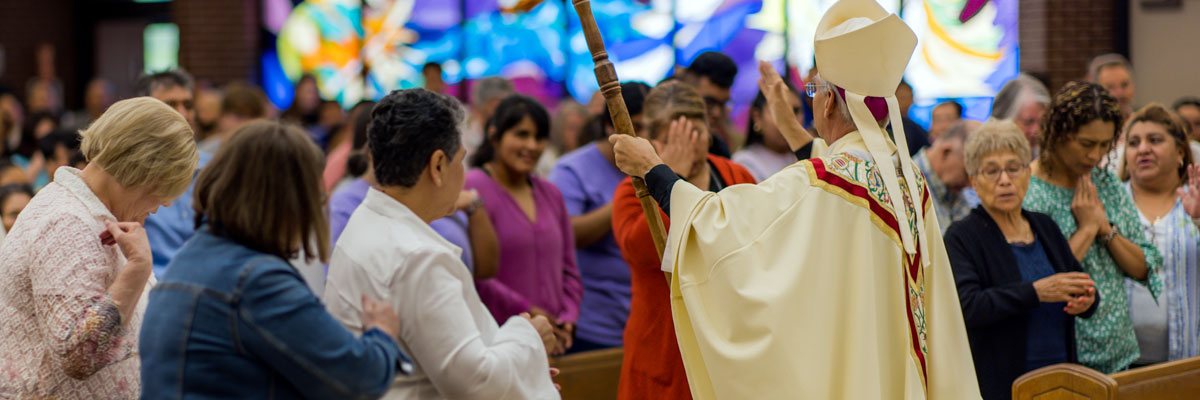Official Website of the
Catholic Diocese of Little Rock
Thanksgiving 2016
Published: November 24, 2016

Bishop Taylor
395 years ago the pilgrims who landed on Plymouth Rock, after losing some of their number on the ship to the New World and before losing many more to the cold of their first winter in America, took a pause in their struggle for survival to give thanks.
Native Americans had taken pity on their ill-prepared neighbors and brought them the food of the New World: turkey, sweet potatoes, pumpkins, cranberries and so on. These English colonists could see the hand of God's saving providence and they were grateful.
This did not, unfortunately, cause them also to see God's goodness in the generous Indians who had saved their lives. The Puritans saw the Indians as pagan sub-human savages, which apparently gave these pious Christians permission to steal their land and, within a few years, wipe them out.
Indeed, the very word, "Eucharist" literally means "thanksgiving" in the original Greek. We see in this banquet the hand of God's saving providence and we are grateful. But when we leave this place, what kind of attitude will we take with us into the rest of life?
They seem not to have made much effort to convert them to Christianity. They may have expressed thanksgiving on that one day 395 years ago, but the rest of the year their attitude was not one of humble gratitude, but rather one of racial superiority and greed.
It's unfortunate that we have come to regard the religious eccentrics who came over on the Mayflower as the founders of our country. It's also inaccurate. Even from the standpoint of the history of colonization, Massachusetts was not the first state to receive European settlers.
Florida and New Mexico were first settled in the 1500s, but they were Hispanic and Catholic so I guess they don't count in the weaving of our national mythology. Then came the lost colony of Roanoke, North Carolina and the first successful English colony in Jamestown.
Blacks from West Africa were already slaving away in Virginia well before the Puritans landed on Plymouth Rock, but I guess they don't count either. After all, the South lost the Civil War. And then the Dutch founded New Amsterdam and the first Jews arrived, but they weren't English and so they apparently don't count either.
We say a lot about ourselves by the way we tell our national story, which should be an inclusive story that celebrates our rich diversity and atones for sins that go back to the very origin of European settlement here.
When Thanksgiving is celebrated as an isolated event that does not flow from an everyday attitude of humble gratitude, it can easily degenerate into a celebration of the superiority of our nation and indeed the pride of place of certain groups of people in our national self-understanding. In other words, a celebration that divides rather than unites. The Puritans interpreted God's goodness to them to be a sign of God's favor for them, over against the pagan Native Americans through whom — ironically — they had received that goodness.
An attitude of humble gratitude is fundamental for anyone who would follow Jesus. The Eucharist that we celebrate all year long is the greatest thanksgiving banquet available in this life and a foretaste of the even greater eucharistic banquet that awaits us in the kingdom of heaven.
Indeed, the very word, "Eucharist" literally means "thanksgiving" in the original Greek. We see in this banquet the hand of God's saving providence and we are grateful. But when we leave this place, what kind of attitude will we take with us into the rest of life?
We are liable to the same arrogant blindness that prevented our so-called founding fathers from seeing God's goodness in the generous Native Americans who saved their lives. And the same greed for the property of others. Greed is the opposite of gratitude.
In the Eucharist, Jesus gives us the food of the New World that he has founded — the kingdom of God that we celebrated last Sunday on the feast of Christ the King. This new food saves us far more effectively than the turkey, sweet potatoes, pumpkins and cranberries eaten that first Thanksgiving Day.
It is bread from heaven, the bread of eternal life, which we receive and for which we literally give thanks in every Eucharist. God grant us the accompanying attitude of humble gratitude.









